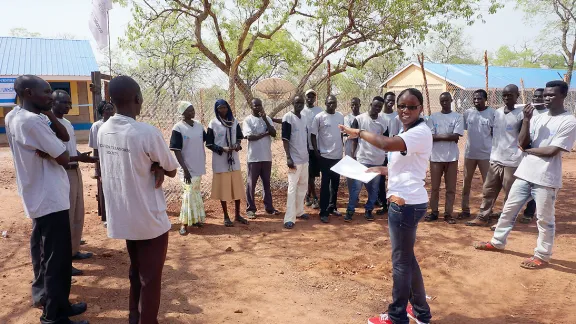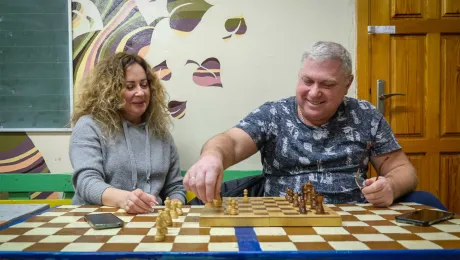
A staff members directs information and communications technology students outside the ICT centre in the Ajuongthok refugee camp where Anne Mwaura works. Photo: LWF/C. Mavenjina
On World Humanitarian Day, Anne Mwaura, team leader for the Department for World Service’s Ajuongthok Refugee Program in northern South Sudan, describes her motivation to make a difference to the lives of children and young people in South Sudan.
In September 2004, I decided to join the humanitarian fraternity after three years of voluntary service in Malawi. In South Sudan, I joined a host of other humanitarian workers building the capacity of local staff and community-based structures among the host community to improve care and support for vulnerable children who lacked the bare essentials of life.
I discovered the mission was richer and more fulfilling than I had ever envisaged. South Sudan was by then emerging from more than two decades of war and on the verge of signing a comprehensive peace agreement with the Khartoum Government.
The country had basic infrastructure begging for reconstruction but it faced numerous barriers to development: people had lost livelihoods and family members during the war, children had been violated by those supposed to protect them, and the country was suffering under the absence of a justice system. I saw a huge opportunity to touch the lives of children and families devastated by war.
A few years later, my mission expanded to working with youth and women supporting livelihood activities, building youth centres and keeping young people constructively engaged instead of raiding cattle and taking part in clan fights.
In Warrap state, in the north, vocational skills training changed the lives of youth, tailoring groups provided women with some support for hungry children, and children and youth interacted and voiced their views through song, drama and play in peace education activities conducted in and out of school.
I started to see happy faces, more peaceful interactions among the youth, constructive forums where adults listened and watched children express their needs and aspirations. Children assured their parents that they were the future and that education was the key to the development of this young nation.
My urge to do more grew by the day, and after each break visiting family back in Kenya, I felt there was more need out there. I returned each time with renewed resolve to do more, touch more lives, put a smile on more faces.
Before I knew it, the plight of Congolese refugees fleeing the Lord’s Resistance Army widened my interest beyond measure. These refugees had fled with nothing into South Sudan from the Democratic Republic of the Congo. They lacked the basics of life: food, clothes, shelter, medicine and education.
I was stuck in a country I thought I would sojourn for only one or two years, get international exposure and return home. Ten years later I am still in South Sudan, this time leading a team responding to a more recent emergency of Sudanese refugees from the South Kordofan province. There is so much to do, so many lives to save and reach, scores of unaccompanied and separated children to place in safe homes. We need to provide access to education and strengthen community resilience in preparation for the day these refugees return to their original home after peace returns, Inshallah (God willing), as they say in Arabic.
I am enjoying my current lap with Sudanese children and families from the Nubian community in Ajuongthok refugee camp, in Unity state, northern South Sudan. It is an interesting journey, I must say. The schools in Ajuongthok that started with only three students in tents donated by UNICEF in March 2013 today educate close to 9000 students.
Now the students have lessons in permanent classrooms constructed and supported by the Church of Sweden, the United Nations refugee agency, UNHCR, and the European Commission’s humanitarian body, ECHO. The first computer lab in the camp has opened a whole new opportunity for learners and teachers.
It never matters that staff live in tents and share basic facilities under the hot weather because we are a committed team that believes in the same ideals and vision: to make a difference in the lives of disadvantaged children and families in this part of the world. That keeps me going, even when a political crisis hit this country and we found ourselves running for dear life in December 2013. I bounced back and a year later, I am still here even with all the uncertainty that the current peace talks present.
I believe there is still hope that peace will come someday and more children will be fed, have access schools and that parents will embrace them one day in a peaceful country, whether here in South Sudan or their home of origin.
Anne Mwaura is the team leader for the Department for World Service’s Ajuongthok Refugee Program in Unity State, South Sudan.


